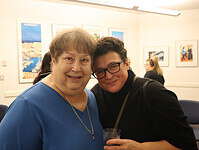In a whirlwind stopover, en route to the JFNA General Assembly in Chicago, Karina Sokolowska, JDC’s (the American Jewish Joint Distribution Committee) country director for Poland, gave a series of briefings to community groups in Tidewater. Sokolowska shared her experiences of meeting Jewish (and other) Ukrainian immigrants at the border with Poland and providing them with a variety of assistance – from food and lodging to medical intervention to paperwork for eventual Aliyah to Israel.
Working in close collaboration with the Jewish Agency for Israel and Natan (the Israeli Center for Medical Assistance), Sokolowska and her professional colleagues and volunteers have taken in and assisted thousands of fleeing Ukrainian refugees—mostly women and children and the elderly (as most Ukrainian men aged 18—60 are forbidden to leave the country). Many of those crossing the border had been traveling for days to reach the safety of Poland. They came from the hardest hit areas of Ukraine—in the east and Crimea, traveling the width of the country to escape the devastating violence and destruction now defining their previous homes. JDC Poland has been and continues to assist these refugees and seeks to address their physical and emotional wellness.
While 3,800 Jewish Ukrainian refugees are currently living in Poland, many more have passed through. A small number have returned to Ukraine; others have gone on to other countries in Europe; and still others have joined family in Israel. Those who have remained in Poland are just a tiny portion of the more than 1.2 million refugees who have crossed over since the war began in late February. The Polish government (and the local municipalities) have been very welcoming to the refugees – opening their hearts and their homes and offering them government benefits. Even before the war, more than 1 million Ukrainians were living and working in Poland. So, a large Ukrainian community already existed (although many young Ukrainian men returned to Ukraine at the outset of the war to help with the fighting). The Polish language is very similar to Ukrainian. And both countries share “Russian as a second language.”
Time and numbers continue to weigh heavy on the Polish society and economy. Jobs are scarce. Prices are high, and shortages abound. There is a real fear of “compassion fatigue,” which may ultimately result in backlash against the immigrants.
JDC is working with Jewish refugees to ensure safe housing and adequate food and medicine. They are making sure that children are in school and that families are invited to Jewish holiday meals, observances, and celebrations. And they are providing social workers and psychologists to address their mental and emotional needs.
“No one believed that their displacement would be for more than a few weeks,” says Sokolowska. “All came believing that they would return home in a short while.” So, as the weeks and now months drag on, the reality is beginning to set in for many of these families. “They are starting to realize that they may not be going home.”
Additional efforts are being made to integrate these refugees into Polish society—job skills training; daycare to allow moms to work; and an expansion of JDC’s welfare operation to address long-term needs for those who, realistically, will remain reliant upon assistance.
“At the beginning of the crisis,” Sokolowska explains, “our professional staff consisted of four people. Now we are 20 people! And a number of our new staff are from among the refugees themselves, including social workers and psychologists. The ‘new language’ of our workplace has become Russian, because we all learned to speak Russian in grade school, and so it is a way for us to communicate.”
There is another side to the Ukraine crisis for JDC, and that is to continue finding ways to take care of vulnerable Jews still inside Ukraine. While millions have fled Ukraine, they represent only about 20% of the overall population, which means that 80% of Ukrainians remain in Ukraine.
JDC has long had a network of Chesed Centers throughout both Russia and Ukraine. Those centers were the epicenters of assistance for Jews throughout the region, providing meals, socialization, medical and welfare checks, as well as a sense of community. The Chesed Centers in the war-torn areas of Ukraine are no longer viable, so JDC must find new ways of reaching out to the Jews still there, to ensure their continued safety and well-being. It’s a real challenge. And there is a new development just beginning to manifest, whose size is yet unknown – the arrival of Jewish refugees from Russia.
JDC Poland finds its hands full as a result of the war in Ukraine, with no immediate end in sight, and no way to know how fast or how great the needs will grow. The situation is alarming and fraught with peril. But as a Jewish community half a world away, it is gratifying to know that JDC, Tidewater’s overseas service delivery partner, will do what it must and help where it can to save lives and assist those in need. This is thanks to the generosity of Federation donors in Tidewater and other Jewish communities across the country.
Kol Yisrael Aravim Zeh B’zeh. All Jews are responsible for one another. Could there be a better representation of that value than the work being done, on our behalf, by the American Jewish Joint Distribution Committee?
Amy Zelenka is United Jewish Federation of Tidewater’s chief development officer. She may be reached at azelenka@ujft.org.
–Amy Zelenka





